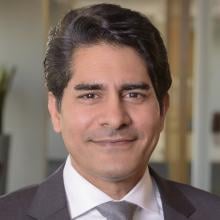Editor’s note: Learn about Dr. Mukkamala’s successful surgical outcome in this Jan. 29, 2025, update.
It was a routine speech, like the countless others that Bobby Mukkamala, MD, has delivered before to groups of AMA members, offering important updates from the Association’s Board of Trustees.
But when Dr. Mukkamala spoke to the AMA Minority Affairs Section earlier this month at the 2024 AMA Interim Meeting in Lake Buena Vista, Florida, the board-certified otolaryngologist and head-and-neck surgeon found himself at a loss for meaningful expression.
“In the middle of my speech, for a couple of minutes, I wasn’t making any sense,” said Dr. Mukkamala, who is the AMA’s president-elect and scheduled to be inaugurated as president in June 2025. “It was English, but none of it made any sense.”
Many physicians in the room worried that the episode of expressive aphasia was a sign that Dr. Mukkamala, 53, had experienced a transient ischemic attack. However, an urgent-care visit in Florida revealed a normal BP reading and an electrocardiogram showed no signs of atrial fibrillation. Having no issues with the other speaking he did that day or during the rest of the meeting, Dr. Mukkamala waited until returning home to Flint, Michigan, to undergo magnetic resonance imaging (MRI).
The MRI revealed an 8 cm temporal lobe tumor on the left side of the brain, one that likely had been growing for years before Dr. Mukkamala recently started noticing small “brain farts,” and not feeling quite as sharp as he’d been as a younger man. Physicians suspect the tumor is a grade 2 glioma. The five-year survival rate ranges between 40–80% depending on the final pathology results.
“There's just no way to know until it's under a microscope, getting more testing,” said Dr. Mukkamala, who added that the plan is to undergo brain surgery in December to remove the tumor.
During the procedure, he will remain awake to answer language-processing queries (“How do you say goodbye in French?”) from neurosurgical team as it carries out the delicate task of removing the tumor without harming essential language-processing functions in the left hemisphere of the brain.
That likely will be followed by chemotherapy and radiation, which Dr. Mukkamala estimates will take him away from patient-care and AMA duties for about two to three months. He already is being treated with levetiracetam (marketed as Keppra) to prevent seizures and steroids to reduce the swelling around the tumor.
Vital protections cast in new light
Navigating a personal health care crisis has given Dr. Mukkamala a renewed insight on the challenges in the U.S. health system.
“My eyes are wide open from the patient perspective,” he said.
Upon learning the diagnosis, Dr. Mukkamala started a file called “tumor wisdom” with his notes and reflections. This note-taking habit is one he’s engaged in for a long time, offering up weekly reflections on life for his twin sons, now 24.
One inescapable truth, Dr. Mukkamala noted, is the deep and vast inequities in the U.S., with health care access, outcomes and lifespans varying dramatically within just a few miles.
“Within 48 hours of this MRI scan, I had half a dozen opinions from leading neurosurgeons around the country,” Dr. Mukkamala noted, with gratitude. “If I lived two miles that way [in Flint], there’s no way that I would even have a picture of my tumor, let alone access to that many opinions that quickly. I’d still be waiting—maybe for prior authorization.”
Such waits are exacerbated, he added, by widespread and worsening shortages in neurosurgery and many other physician specialties, especially in areas that are economically or socially marginalized and underserved by limited access to health care.
“We're short on brain surgeons, so the better we can do to address that shortage, the more likely it is that the guy two miles from here can get in, get an appointment and get a plan in reasonably close to the same amount of time that it took me,” he said.
Moreover, this health crisis has reinforced for Dr. Mukkamala the importance of the Affordable Care Act (ACA) protections against discrimination for patients with preexisting conditions. Dr. Mukkamala happened to renew his ACA family health insurance coverage through HealthCare.gov during open enrollment in early November, ahead of the Interim Meeting.
“And there were no questions about preexisting conditions or anything like that because the Affordable Care Act gives us the ability to get whatever insurance we can,” he said.
Such protections are at risk, “and that concerns me as a physician, and it concerns me as a patient, just because it shouldn't have to be something that's on my mind when I’ve already got an 8 cm mass on my mind—literally in my mind.”
The time is now
There are personal insights, too, in Dr. Mukkamala’s “tumor wisdom” file. By far the hardest part of the experience, he wrote, has been the effort to hold back tears as he breaks the news to friends and loved ones and sees the sadness in their eyes. He has been overwhelmed by the prayers and well-wishes he has received from people of many different faiths and from many walks of life.
This life-altering diagnosis, he wrote, presents “a unique opportunity to share thoughts that usually go unsaid, thinking that there will always be time to share later.”
But the time to say what’s on your mind and in your heart is now, Dr. Mukkamala noted. The first item on his list reads: “Don’t wait to show affection to people until a moment like this.”
So: Pull someone you love close tonight and tell them how much they mean to you. If they ask what prompted you to do so, just say it was the doctor’s orders.





